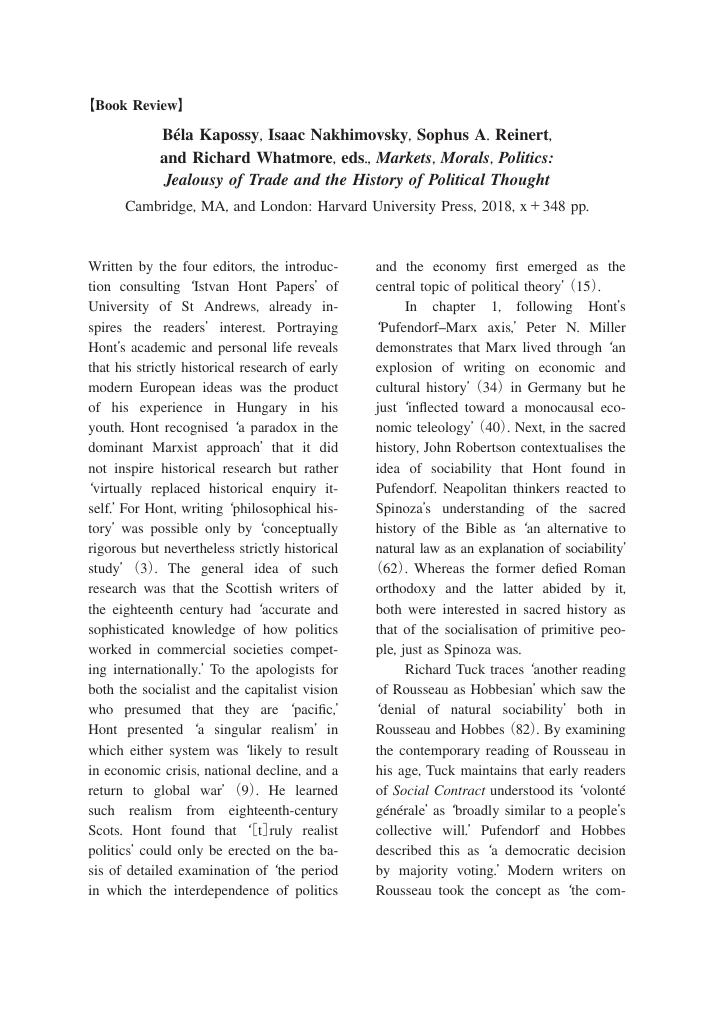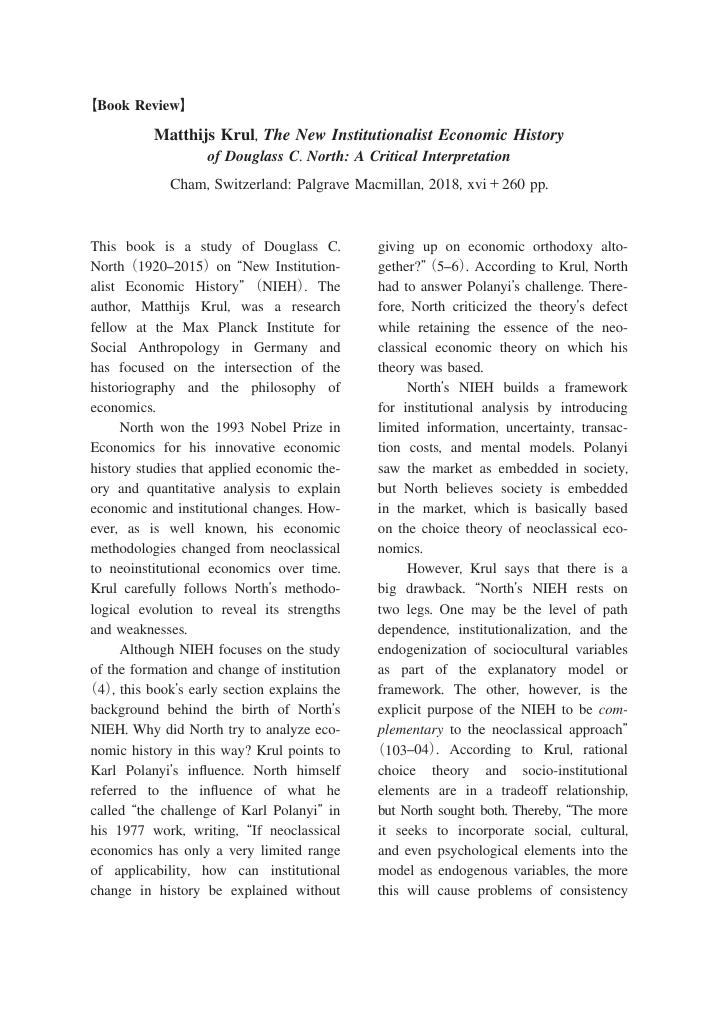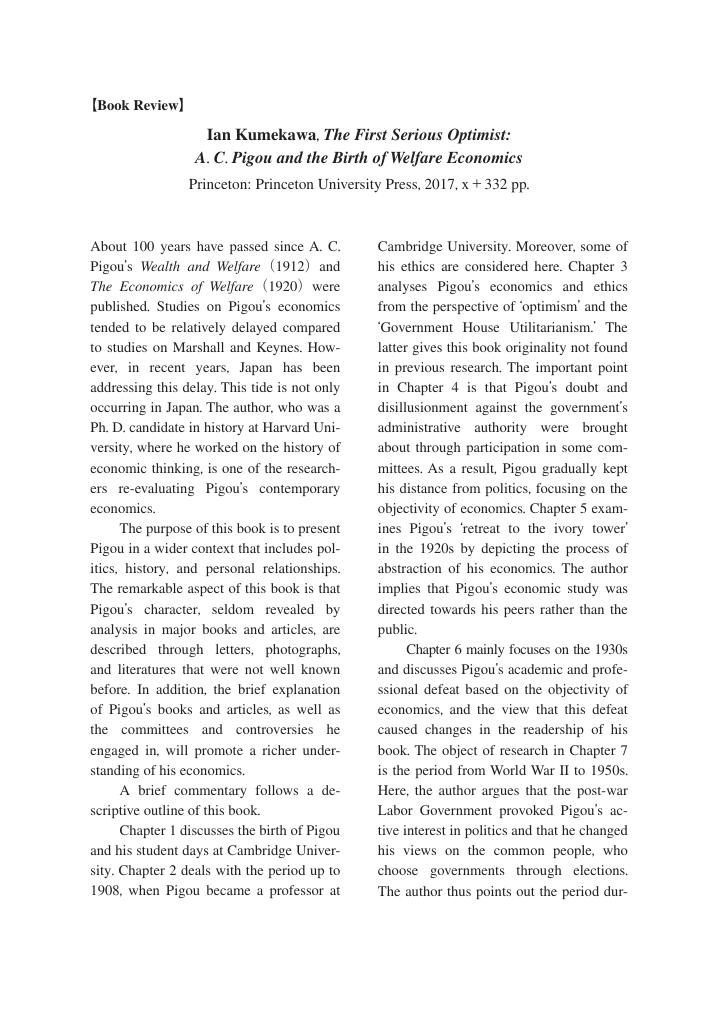- 著者
- 井坂 友紀
- 出版者
- The Japanease Society for the History of Economic Thought
- 雑誌
- 経済学史研究 (ISSN:18803164)
- 巻号頁・発行日
- vol.64, no.2, pp.1-18, 2023-01-25 (Released:2023-08-05)
- 著者
- Seiichiro Ito
- 出版者
- The Japanease Society for the History of Economic Thought
- 雑誌
- 経済学史研究 (ISSN:18803164)
- 巻号頁・発行日
- vol.63, no.1, pp.62-63, 2021 (Released:2022-01-09)
- 著者
- Shingo Talahashi
- 出版者
- The Japanease Society for the History of Economic Thought
- 雑誌
- 経済学史研究 (ISSN:18803164)
- 巻号頁・発行日
- vol.62, no.2, pp.83-84, 2020 (Released:2021-12-05)
- 著者
- Thierry Demals
- 出版者
- The Japanease Society for the History of Economic Thought
- 雑誌
- 経済学史研究 (ISSN:18803164)
- 巻号頁・発行日
- vol.62, no.2, pp.85-87, 2020 (Released:2021-12-13)
1 0 0 0 OA Maria Cristina Marcuzzo, Essays in Keynesian Persuasion Cambridge Scholars Publishing, 2019
- 著者
- Toshiaki Hirai
- 出版者
- The Japanease Society for the History of Economic Thought
- 雑誌
- 経済学史研究 (ISSN:18803164)
- 巻号頁・発行日
- vol.62, no.2, pp.88-89, 2020 (Released:2021-12-13)
- 著者
- Maria Pia Paganelli
- 出版者
- The Japanease Society for the History of Economic Thought
- 雑誌
- 経済学史研究 (ISSN:18803164)
- 巻号頁・発行日
- vol.62, no.2, pp.90-91, 2020 (Released:2021-12-13)
- 著者
- Tsuyoshi Yuki
- 出版者
- The Japanease Society for the History of Economic Thought
- 雑誌
- 経済学史研究 (ISSN:18803164)
- 巻号頁・発行日
- vol.62, no.2, pp.92-93, 2020 (Released:2021-12-19)
- 著者
- Shigeyoshi Senga
- 出版者
- The Japanease Society for the History of Economic Thought
- 雑誌
- 経済学史研究 (ISSN:18803164)
- 巻号頁・発行日
- vol.62, no.2, pp.81-82, 2020 (Released:2021-12-05)
1 0 0 0 OA ‘As One of the Swinish Multitude’
- 著者
- 中澤 信彦
- 出版者
- The Japanease Society for the History of Economic Thought
- 雑誌
- 経済学史研究 (ISSN:18803164)
- 巻号頁・発行日
- vol.62, no.1, pp.78, 2020 (Released:2021-08-27)
1 0 0 0 OA 玉野井芳郎「エコノミーとエコロジー」
- 著者
- 八木 紀一郎 チャペスキー ロバート 玉野井 芳郎
- 出版者
- The Japanease Society for the History of Economic Thought
- 雑誌
- 経済学史研究 (ISSN:18803164)
- 巻号頁・発行日
- vol.62, no.1, pp.51-75, 2020 (Released:2020-10-16)
- 被引用文献数
- 1
- 著者
- 浅田 統一郎
- 出版者
- The Japanease Society for the History of Economic Thought
- 雑誌
- 経済学史研究 (ISSN:18803164)
- 巻号頁・発行日
- vol.61, no.1, pp.135-136, 2019 (Released:2019-10-14)
- 著者
- 熊谷 次郎
- 出版者
- The Japanease Society for the History of Economic Thought
- 雑誌
- 経済学史研究 (ISSN:18803164)
- 巻号頁・発行日
- vol.61, no.2, pp.1-21, 2020 (Released:2020-02-26)
Contemporary British historians are almost unanimous in positing a close relation between the growth of the British economy and the colonial empire after the Glorious Revolution. The formation of the British colonial empire concurrently led to a new turn in mercantile economic thought. During the late 17th and early 18th centuries, the rationale for the concept and significance of the advantages of foreign trade shifted from the “balance of trade” theory to the “balance of labor” or “foreign-paid incomes” one. L. Magnusson, a leading contemporary scholar on mercantilism, attributes the emergence of the latter theory partly to the advent of a new science of trade,2 but he hardly mentions the relation between the theory and the remarkable development of colonial empire trade. Most mercantilists employing this theory, however, assiduously regarded British colonies and dependencies as growing and promising markets for the development of various industries as well as the increase in labor employment in Britain. This paper attempts to illustrate the importance of the theory in the context of both an emerging transatlantic colonial empire and an awareness of the economic crisis of Britain in relation to European competitors. This paper mainly deals with the arguments of Daniel Defoe, Malachy Postlethwayt, Mathew Decker, and Josiah Tucker. By examining their discourses, it shows conclusively that in the mid- and late 18th century, there was a typical mercantile imperialist (Postlethwayt) at one extreme and a so-called free trade imperialist( Tucker) on the other. However, the extreme-position holders shared the view that the colonies and dependencies were indispensable for the development of the British economy and the more extensive circulation of its trade.
- 著者
- 西岡 幹雄
- 出版者
- The Japanease Society for the History of Economic Thought
- 雑誌
- 経済学史研究 (ISSN:18803164)
- 巻号頁・発行日
- vol.61, no.2, pp.22-39, 2020 (Released:2020-02-26)
- 被引用文献数
- 1
Economic thought in pre-modern Japan was different from Western rationalism in that it did have a religious basis in the aspect of self-interest. Therefore, the Japanese society had to address tensions between public and individual interests, as pre-modern Japan had yet to understand the essence of institutionalisation as a deepening of the market, which included regionalisation and commerce. This paper will discuss Nakai Chikuzan (中井竹山, 1730-1804), who not only entrusted the adjustment of the ‘interests of the whole nation’ (「万民ノ利」) and the public good to internal social morality through giri(「義利」) but also sought public welfare and institutional recognition for the stabilisation of local societies. His emphasis on public welfare and social stability was important for the time restriction problem in relation to the maintenance of the moral and cooperative community, as well as the formation of economic rationality as an internal mechanism to address people’s interests.
1 0 0 0 OA 渡辺輝雄「ボード―の奢侈論」
- 著者
- 渡辺 輝雄 Robert Chapeskie 米田 昇平
- 出版者
- The Japanease Society for the History of Economic Thought
- 雑誌
- 経済学史研究 (ISSN:18803164)
- 巻号頁・発行日
- vol.61, no.2, pp.40-77, 2020 (Released:2020-02-26)
- 著者
- 石田 教子
- 出版者
- The Japanease Society for the History of Economic Thought
- 雑誌
- 経済学史研究 (ISSN:18803164)
- 巻号頁・発行日
- vol.61, no.2, pp.76-77, 2020 (Released:2020-02-29)
1 0 0 0 OA 高島善哉「国富論と生産力の体系」
- 著者
- 高島 善哉 星野 彰男 Robert Chapeskie
- 出版者
- The Japanease Society for the History of Economic Thought
- 雑誌
- 経済学史研究 (ISSN:18803164)
- 巻号頁・発行日
- vol.61, no.1, pp.66-91, 2019 (Released:2019-10-01)
Introduction by Akio Hoshino Zenya Takashima (1904-90)ʼs ʻThe Wealth of Nations and the System of Productive Powers,ʼ which has been translated into English here, is Chapter 5 of Part 2, “Adam Smith and the Problem of Civil Society,” in The Fundamental Problem of Economic Sociology-Smith and List as Economic Sociologists-, Tokyo: Nihon Hyoronsha, 1941 (The Works of Zenya Takashima, vol. 2, 1997, Tokyo). It was written in the midst of the Second Sino-Japanese War (1937-45) and directly before Japanʼs involvement in the Second World War (1941-45), a period during which the military system severely suppressed both academic inquiry and the general population. In modern Japan (1868- ), there was a particular emphasis on the introduction of German institutions and culture, and Friedrich Listʼs political economy and its national policy of productive powers were therefore welcomed. This work of Takashimaʼs called into question the prevailing trends at the time, and managed to achieve publication in spite of the severe censorship to which such texts were subjected. Because it talked about “Smith as List” and “List as Smith,” the censors seem not to have been able to understand its central critique. Having been written under such circumstances, its prose became very complicated and difficult, but it was covertly held in high regard. It has been said that many of its readers understood its ironic implication, and that some even took it to be a cover for Marxism. Its core chapter that regards Smithʼs moral philosophy as of greatest importance (Chapter 2: ʻThree Worlds in Smithʼ) has already been translated into English (Adam Smith: Critical Responses, vol. 5, edited by Hiroshi Mizuta, Routledge, 2000). The theme of Chapter 5 is solely Smithʼs economic theory.
- 著者
- 高見 典和
- 出版者
- The Japanease Society for the History of Economic Thought
- 雑誌
- 経済学史研究 (ISSN:18803164)
- 巻号頁・発行日
- vol.61, no.1, pp.94-103, 2019 (Released:2019-10-01)
- 被引用文献数
- 1
1 0 0 0 OA Harry Bloch: Schumpeter’s Price Theory. London and New York: Routledge, 2018, xiii+174 pp.
- 著者
- 本吉 祥子
- 出版者
- The Japanease Society for the History of Economic Thought
- 雑誌
- 経済学史研究 (ISSN:18803164)
- 巻号頁・発行日
- vol.61, no.1, pp.129-130, 2019 (Released:2019-10-14)
- 著者
- 松本 哲人
- 出版者
- The Japanease Society for the History of Economic Thought
- 雑誌
- 経済学史研究 (ISSN:18803164)
- 巻号頁・発行日
- vol.61, no.1, pp.133-134, 2019 (Released:2019-10-14)
- 著者
- 山本 崇史
- 出版者
- The Japanease Society for the History of Economic Thought
- 雑誌
- 経済学史研究 (ISSN:18803164)
- 巻号頁・発行日
- vol.60, no.2, pp.115-116, 2019 (Released:2019-10-14)















